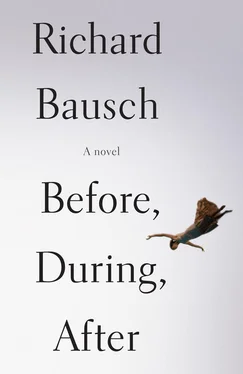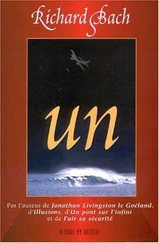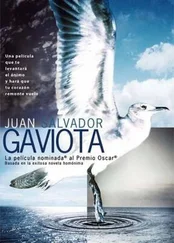“I don’t want anything else.”
“Okay.”
“I’m grateful to you for the time here.”
“Well, for some of the time here.”
The waiter brought the drinks on a small tray. Constance took the Mount Gay with one swallow, then wiped the back of her hand across her mouth. “I swear I’ve never drunk this much.”
“I promise I won’t tell anyone about your drinking,” Natasha said.
Sipping her beer, the other woman looked over the lip of the glass at her, then set the glass down, smiling.
“Good night,” said Natasha.
“You probably won’t see me tomorrow.” Constance picked up her glass of beer again, drank from it, and set it down. “My flight’s at seven o’clock in the morning.” She stood as Natasha stood. They embraced. “I’ll miss you, you know.”
“I’ll miss you, too,” Natasha told her, feeling empty and wanting to be shut of her.
“When you make the wedding plans, let me know?”
“Early next month. I know that.”
“Maybe I’ll come? If asked.”
“We both want it small.”
“Let me know? I’d love to be there. I want to be there.”
“I’ll let you know.”
Constance looked at her.
“I will.”
She sighed. “I’ll be in Maine over the Christmas holidays. You and Michael are welcome.”
“I think we’re leaving for France pretty soon after that. Lots of planning to do. But thank you.” Natasha went on up to her room and closed the door and saw that there was a message on the phone. She punched the button and then lay down and let it play, and cried softly, hearing him say, “I can’t wait, babe.”
She replayed it twice, then called the front desk and asked the female voice to put in the return call. There was no answer, and she left her own message. “I’m coming home. Soon, my love.” She heard the frail sound of her own voice.
7
Faulk spent the morning looking at houses and apartments in Midtown. He played the radio, driving from property to property — air conditioner turned up full blast — following a kindly, quiet, elderly gentleman named Rainey, whose thick shoulders, long face, and protruding lengthy ears put him in mind of his father. Rainey stood by while the younger man went through rooms that were being lived in and contained intimations of the lives their occupants led, or toured houses that were vacant, standing in musty, old-wood-smelling parlors, looking down hallways and into closets and walking out onto back lawns in the scorching brightness, moving through the peculiarly depressing silence of abandoned dwellings. All the forenoon they were at it, getting into their respective cars and heading on to the next property. The air had already grown sultry by nine o’clock, laden with dampness and the smell of exhaust — late summer in the city. The ends of tree branches drooped, and the scattered wide shady patches on the lawns made Faulk think of something spilled. He listened to the different voices on the radio talking about the cataclysm, the developing crisis, the new face of war, and all the victims who were missing. Finally he turned it off, unable to bear it anymore.
He felt empty. Rainey caught his mood. “Not liking much of what you see,” he said.
Faulk shook his head and sighed.
“This is not a good time, is it,” the older man went on. “A bad time for all of us.”
“Yeah.”
“And of course you have to go with your gut when it comes to picking a place to live.”
“You remind me of my father,” Faulk told him. He hadn’t known he would say it.
“Hope that’s a good thing. Is he still with us?”
“Yes. Very healthy. A little touch of gout now and then and some trouble with peripheral vision. He lives in Little Rock.”
“My mother’s got trouble with that. The peripheral vision thing. Still going strong, though. Ninety-two and sharp as a tack. She said something to me this week — stopped me. We’d been talking about it all, you know, and she said — I mean she was smiling, but I think she was half serious — said things get so bad and ugly all around you, everything changing for the worse as you age, that you don’t hate so much the idea of going.”
They were standing in the center of a large square living room with freshly polished hardwood flooring. An arched entrance opened into a freshly remodeled kitchen.
“Good light here with these windows,” said Rainey.
“I should probably have waited until my fiancée could be with me,” Faulk told him. “I’m sorry.”
“Well, but it’ll be good to have an idea, anyway.”
“This is very nice.”
“I had a place just like this once. Raised three girls in it. Theresa, Coleen, and Marilyn.”
“My mother’s name was Marilyn.”
“Good name. I picked that one.”
Faulk imagined him as a young man. “Do they live close?”
“Not too far away.” Rainey sighed. “One’s in Chicago, and two’re in Nashville. I get to see them pretty often. Them and the grandkids. I’ve got nine grandkids. Each of my girls has three boys.” He smiled. “I tell them it’s a baseball team.”
“That’s wonderful.”
“I’m afraid they’ll all end up as part of a platoon, now.”
Faulk nodded. “Bad,” he said.
“Should we take a look at the upstairs?”
“I’ll keep it in mind. Might be a little big for just two. Can we look at the ones in High Point?”
They walked out and got into their separate cars. Faulk looked back at the house, with its porch and the forsythia lining the left side of the front yard. Mr. Rainey pulled away slowly, and they went on down to the end of the street, toward Poplar Avenue.
Following the real-estate agent, Faulk thought of his father. He did not put the radio on. It was hard to feel himself in his own age, almost fifty. The road ahead was blue, baking in the sunlight, an end-of-summer day in Memphis, Tennessee, in the United States, and a war had begun. He had seen in the news that religious fanaticism was the one motive being advanced most by observers (there were already acts of violence against mosques and shrines), and it came to him that just now he felt detached from it all. He was driving around Memphis looking for a house and a neighborhood, anticipating life with a new, young wife, and when he thought of her he felt excitement, even gladness. Yet there was something faintly reflexive about that, too.
At High Point Terrace, Mr. Rainey showed him a couple of houses, and then they came to one on Swan Ridge, where the key in the lockbox was the wrong one. Faulk liked the look of the house and the yard, and Mr. Rainey tried calling his office. But he had to leave for another appointment. The two men arranged to meet later in the morning.
Faulk drove back to his apartment, opened a can of ravioli, heated it, and ate, and then called his father.
“Glad you’re home,” the old man said. “I talked to Clara and she said you were on your way.”
“I’d have called when I got here, but it’s been crazy.”
“Your girlfriend get home okay?” This was simply his way of speaking.
“I pick her up late this afternoon.”
“You find a place yet?”
“I think maybe I have.”
“You figured out what you’re gonna do, now that the church thing is over?”
“Dad.”
“Just curious. I don’t mean anything by it.”
“You make it sound like some phase I was going through.”
“Well,” the old man grumbled. “No sense giving all your money to the phone company.”
“Right,” Faulk answered with an old sense of being held at an emotional remove.
“Make a trip out here, why don’t you, now that you’re not a priest anymore.”
“That sounds like now you’ll be able to tolerate me, since I’m a layman.”
Читать дальше












